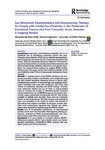Eye Movement Desensitisation and Reprocessing Therapy for People with Intellectual Disability in the Treatment of Emotional Trauma and Post Traumatic Stress Disorder: A Scoping Review
| dc.contributor.author | Smith, AN | |
| dc.contributor.author | Laugharne, R | |
| dc.contributor.author | Oak, K | |
| dc.contributor.author | Shankar, Rohit | |
| dc.date.accessioned | 2021-06-07T10:32:19Z | |
| dc.date.available | 2021-06-07T10:32:19Z | |
| dc.date.issued | 2021-07-03 | |
| dc.identifier.issn | 1931-5864 | |
| dc.identifier.issn | 1931-5872 | |
| dc.identifier.uri | http://hdl.handle.net/10026.1/17219 | |
| dc.description.abstract |
Introduction: Individuals with intellectual disability (ID) are at significant risk of developing emotional trauma and post-traumatic stress disorder (PTSD) due to altered neuropsychological functioning, increased chance of experiencing adverse life events, difficulty expressing emotions, diagnostic overshadowing and institutional failures. Eye Movement Desensitization and Reprocessing Therapy (EMDR) is efficacious in the general population, but research lacks evidence to suggest EMDR remains effective in ID. This paper assesses the evidence available on the use of EMDR to treat PTSD in ID and provide direction for future research. Methods: A scoping review using PRISMA guidance was conducted. PsychInfo, Embase and Medline were completed using the NICE Health Databases Advanced Search in March 2020. Supplementary searches of Joanna Briggs and ongoing randomized controlled trials were also conducted. The terms used related to Intellectual disability and EMDR therapy. Searches were conducted without the use of PTSD or trauma-related terms to increase the number of identified articles. Inclusion criteria involved the use of EMDR therapy as the primary intervention using a population of individuals with ID. Only articles available in English were included. There were no exclusions related to the study design. All study designs and publication types were included in this review to capture the breadth of information that might be available on the topic. Articles identified were summarized, appraised and collated into tables. Papers were assessed for quality using the GRADE criteria. Results: Out of 16 identified publications, 13 demonstrated positive results and 3 less favorable. Heterogeneity among participants, variations in EMDR protocol/adaptations, and variation in trauma and PTSD assessment were prevalent. Conclusions: It is not possible to conclude whether EMDR is efficacious in people with ID. Future studies need to use homogenized populations, standardized EMDR protocol and validated trauma and PTSD assessments. | |
| dc.format.extent | 237-284 | |
| dc.language | en | |
| dc.language.iso | en | |
| dc.publisher | Informa UK Limited | |
| dc.rights | Attribution-NonCommercial-NoDerivatives 4.0 International | |
| dc.rights | Attribution-NonCommercial-NoDerivatives 4.0 International | |
| dc.rights | Attribution-NonCommercial-NoDerivatives 4.0 International | |
| dc.rights | Attribution-NonCommercial-NoDerivatives 4.0 International | |
| dc.rights | Attribution-NonCommercial-NoDerivatives 4.0 International | |
| dc.rights | Attribution-NonCommercial-NoDerivatives 4.0 International | |
| dc.rights.uri | http://creativecommons.org/licenses/by-nc-nd/4.0/ | |
| dc.rights.uri | http://creativecommons.org/licenses/by-nc-nd/4.0/ | |
| dc.rights.uri | http://creativecommons.org/licenses/by-nc-nd/4.0/ | |
| dc.rights.uri | http://creativecommons.org/licenses/by-nc-nd/4.0/ | |
| dc.rights.uri | http://creativecommons.org/licenses/by-nc-nd/4.0/ | |
| dc.rights.uri | http://creativecommons.org/licenses/by-nc-nd/4.0/ | |
| dc.subject | EMDR | |
| dc.subject | PTSD | |
| dc.subject | intellectual disability | |
| dc.subject | trauma | |
| dc.title | Eye Movement Desensitisation and Reprocessing Therapy for People with Intellectual Disability in the Treatment of Emotional Trauma and Post Traumatic Stress Disorder: A Scoping Review | |
| dc.type | journal-article | |
| dc.type | Review | |
| dc.type | Journal | |
| plymouth.author-url | https://www.webofscience.com/api/gateway?GWVersion=2&SrcApp=PARTNER_APP&SrcAuth=LinksAMR&KeyUT=WOS:000658609800001&DestLinkType=FullRecord&DestApp=ALL_WOS&UsrCustomerID=11bb513d99f797142bcfeffcc58ea008 | |
| plymouth.issue | 3 | |
| plymouth.volume | 14 | |
| plymouth.publication-status | Published | |
| plymouth.journal | Journal of Mental Health Research in Intellectual Disabilities | |
| dc.identifier.doi | 10.1080/19315864.2021.1929596 | |
| plymouth.organisational-group | /Plymouth | |
| plymouth.organisational-group | /Plymouth/Faculty of Health | |
| plymouth.organisational-group | /Plymouth/Users by role | |
| dc.identifier.eissn | 1931-5872 | |
| dc.rights.embargoperiod | Not known | |
| rioxxterms.versionofrecord | 10.1080/19315864.2021.1929596 | |
| rioxxterms.licenseref.uri | http://creativecommons.org/licenses/by-nc-nd/4.0/ | |
| rioxxterms.type | Journal Article/Review |



